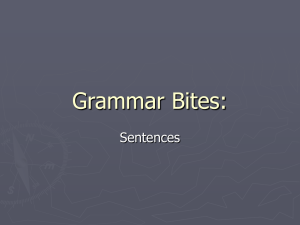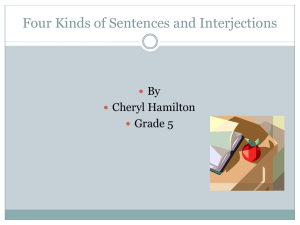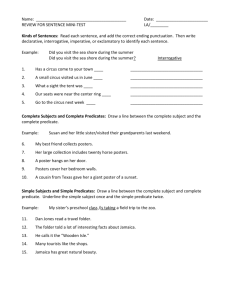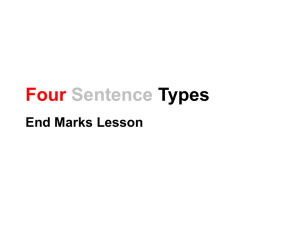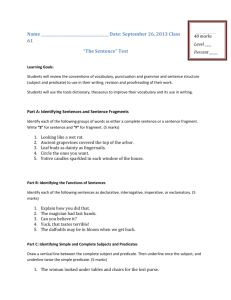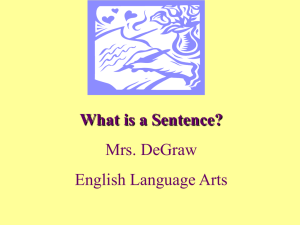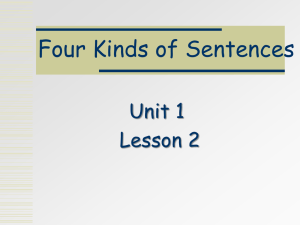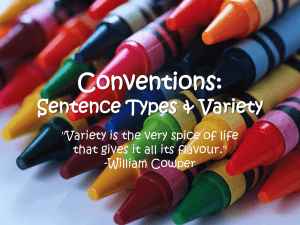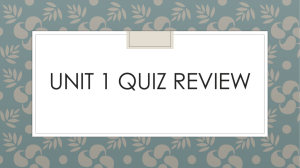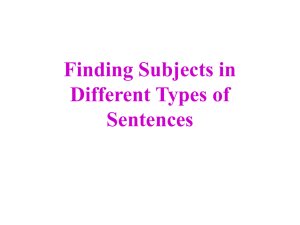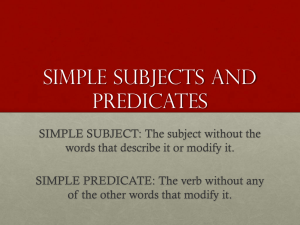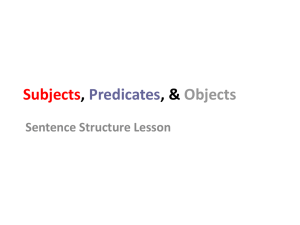Sentences and Fragments
advertisement
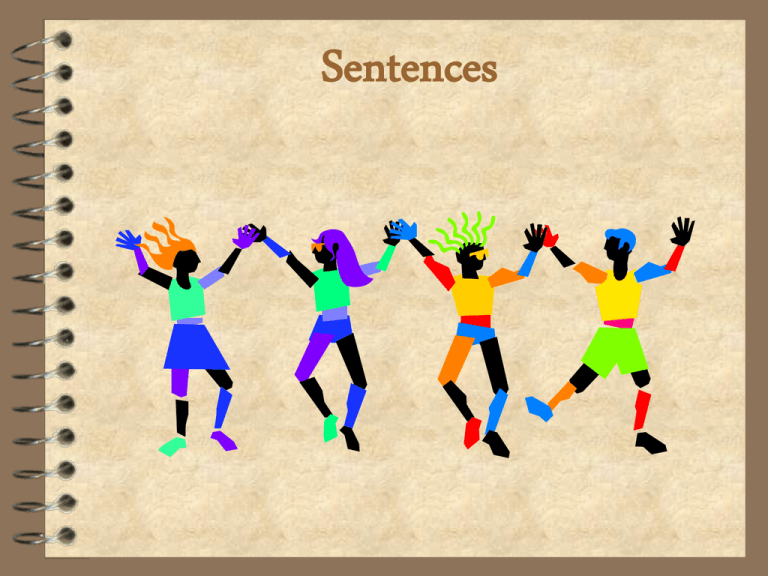
Sentences Sentences What’s a sentence??? A sentence is a group of words that states a complete idea. Punctuating Sentences Sentences begin with capital letters... S andy threw the football to me . I sn’t learning about sentences lots of fun? H elp ! …and end with a punctuation mark. Fragments Huh?? A fragment is part of a sentence. The naming or action part is missing. Let’s try some: Sentence or fragment? F Playing doctor. S S The little boy is playing. Pretending to be a doctor can be lots of fun. Put the stethoscope around your neck. S Let’s try some more! Sentence or fragment? S The pirate is missing a tooth. F Red bandanna circling his head. F Yo, ho, ho and a bottle of Coke. S Where is that pesky Peter Pan? 4 Kinds of Sentences Declarative Interrogative Imperative Exclamatory Declarative Sentences A declarative sentence makes a statement or tells something. He lost the tennis match. His racket is broken. Interrogative Sentences An interrogative sentence asks a question. Can he swim? Is there water in the pool? Who taught him to dive? Imperative Sentences An imperative sentence gives an order, or command. Hit the board. Get ready. Use a chopping motion. Exclamatory Sentences An exclamatory sentence shows excitement or strong feeling. What a great race! He won! Let’s try some: Declarative, Imperative, Interrogative, or Exclamatory? E Watch out! D That guy got hit on the head. IN Did it hurt you, mister? Im Next time, yell “Fore”. Now try these: Declarative, Imperative, Interrogative, or Exclamatory? D Some people raise bees for a hobby. E Ouch! I’m stung! Im Cover the box. IN Can you hear the buzzing? D Some bees are called “yellow jackets”. Parts of a sentence Subject The subject part names whom or what the sentence is about. Predicate The predicate part tells what action the subject part does. Several little ladybugs landed on the porch swing. Subjects/Predicates The number of words on each side of the fence is not important. The action word must be behind the fence. Sam / drives a train between Buffalo and Rochester. / The strong, intelligent, safety-minded engineer steered. Let’s try some: Use a fence to separate subject and predicate. / The Jones family waves to the lion. / The King of the Beasts stares back at them. / Mom prefers monkeys. The children listen to the lion’s roar. / / Thousands of people visit the lions’ cages each day. Now try these: Use a fence to separate subject and predicate. / France gave us the Statue of Liberty. / On Ellis Island, the immigrants viewed her as a symbol of freedom. / Her torch lights the way to a new life. / She stands in New York’s harbor. Simple Subjects The simple subject is the main word in the subject part. (Naming!) ss The huge green and red dinosaur scared me. ss His tail is long and scaly. ss Someone is following him. Simple Predicates The simple predicate is the main word in the predicate. (Action!) sp me! That ape frightens sp His green shirt stretches. sp His long arms hang almost to the floor. Let’s try some: Identify the simple subjects and simple predicates. SS SP A three ring circus came to town. SS SP The purple and blue striped tent towered over everything. SS SP The clowns made people laugh. Now try these: Identify the simple subjects and simple predicates. SS liked SP the little brown One horse dog. SS SP The clown with the whip wore green pants and yellow boots. SS SP Animal acts entertain many people in the audience. Compound Subjects A compound subject has two or more simple subjects that have the same predicate. Sally, Tad, Stu, and Derek marched in a parade. Flags and dogs’ tails waved. Conjunctions Conjunctions are connecting words. – And The penguin and snowman are – Or friends. – But The snowman’s eyes and mouth are made of coal. He will melt or fall over in the sun. Compound Predicates A compound predicate has two or more verbs that have the same subject. This penguin sings and dances. His flippers shake, rattle, and roll. The tides ebb and flow as he grooves to the music. Let’s try some: Does the sentence have a compound subject (CS) or compound predicate (CP)? CP The mouse steals and eats the cheese. CS His ears and tail wiggle in delight. CP Mousy’s big white teeth nibble and gnaw. CS His nose and whiskers quiver in anticipation. Now try these: Does the sentence have a compound subject (CS) or compound predicate (CP)? CS The tortoise and the hare entered the race. CP The hare played and slept. CP The tortoise plodded along and crossed the finish line. Compound Sentences A compound sentence is a sentence that contains two simple sentences joined by a conjunction. I like dogs, and I love stories about them. Some dogs are ferocious, but my dog is friendly. Let’s review: Read each pair of simple sentences. Make them into one compound sentence. Some crocodiles live in Florida. Other crocodiles live in Africa. Crocodiles have narrow heads. Their teeth are long. We saw some crocodiles in Florida. Jane almost stepped on one.
